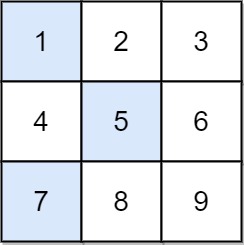Class Solution
java.lang.Object
g1201_1300.s1289_minimum_falling_path_sum_ii.Solution
1289 - Minimum Falling Path Sum II\.
Hard
Given an `n x n` integer matrix `grid`, return _the minimum sum of a **falling path with non-zero shifts**_.
A **falling path with non-zero shifts** is a choice of exactly one element from each row of `grid` such that no two elements chosen in adjacent rows are in the same column.
**Example 1:**

**Input:** arr = \[\[1,2,3],[4,5,6],[7,8,9]]
**Output:** 13
**Explanation:** The possible falling paths are: [1,5,9], [1,5,7], [1,6,7], [1,6,8], [2,4,8], [2,4,9], [2,6,7], [2,6,8], [3,4,8], [3,4,9], [3,5,7], [3,5,9] The falling path with the smallest sum is [1,5,7], so the answer is 13.
**Example 2:**
**Input:** grid = \[\[7]]
**Output:** 7
**Constraints:**
* `n == grid.length == grid[i].length`
* `1 <= n <= 200`
* `-99 <= grid[i][j] <= 99`
-
Constructor Summary
Constructors -
Method Summary
-
Constructor Details
-
Solution
public Solution()
-
-
Method Details
-
minFallingPathSum
public int minFallingPathSum(int[][] grid)
-